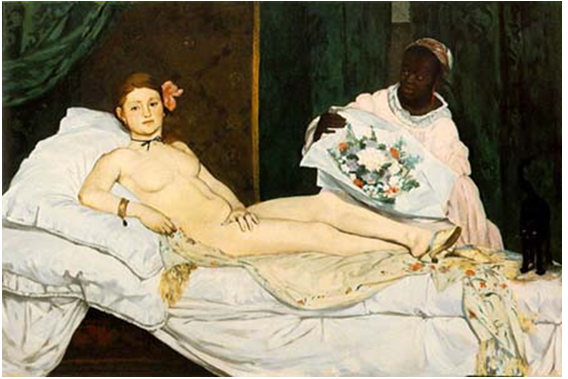The French painter of “Olympia,” Edouard Manet, created this amazing and controversial piece of art back in 1865. If you’re interested in the “Olympia” (Edouard Manet) analysis, read this sample essay. Why did Manet paint “Olympia”? You’ll learn the art history of this painting in this paper and understand the connection between “Venus of Urbino” and “Olympia.”

Olympia (Manet) Analysis: Introduction
Edouard Manet was a French realist artist. He painted the Olympia in 1863 although the painting was first exhibited in 1865. Olympia is an oil on canvas painting with dimensions of 130.5 by 190 centimeters. It is currently being displayed at the Musee D’Orsay in Paris, France.
I choose Olympia since the painting’s exhibition sparked an outcry from the public and changed people’s perception of the painter. Thus, while most of the realist artists portrayed the real life of people, Manet chose to portray it using a controversial painting of a naked lady full of symbolism.
Manet — Olympia: Analysis of Visual Elements
The painting was unusual compared to other paintings by Manet. Olympia was too visual and clear since the artist painted it in such a way that all the symbols he used were noticeable, as it was done with brushstrokes that were strong, broad, and quick. This style of painting was regarded as immature and not expected from someone of Manet’s caliber.
The painting brings out the naked woman who is depicted having a pale skin tone such that whenever light strikes the painting, she becomes the focal point. The black cat and the African maid also enhance this focus, since they are painted in a dull black color, and thus they divert no attention from the main focus of the painting. They achieve this by creating a contrast in color compared to the naked woman. More so, the composition of the painting is made up of surfaces with a large color, which is shallow in-depth, thus creating a contrast when lights are shone due to the presence of mid-tones.
The large color surfaces are used to enhance the desired contrast, while the eliminated mid-tones provide a clearer contrast between the pale-skinned naked woman, the dark-skinned maid and the black cat in the painting. Furthermore, if bright lighting is used, then her nudity is emphasized.
Olympia Painting: Meaning
The painting uses a lot of symbolism about the historical scene, and the fact that she was naked and her maid was fully dressed indicates she was a prostitute. Furthermore, the woman is a representation of sensuality due to the flowers she receives as well as the numerous accessories she is wearing. Besides, she is painted nude and wearing shoes showing that she was a commodity for sale. Also, by covering herself with her left hand, she expresses sexual independence and offers sexual pleasures for payment. Finally, the black cat is traditionally considered a symbol of prostitution.
The painter was a realist and painted daily aspects of the French in Paris. This was his attempt to expose elements of their daily lives that often take place without being mentioned. The woman is painted gazing straight at the viewer while normally such a painting would try to conceal the face of the woman; Manet uses this to show the woman’s defiance.
Venus of Urbino and Olympia
Manet chose to address prostitution since the society had accepted that it was a normal activity and yet when forced to talk about it, they were embarrassed because it was considered immoral to be involved in prostitution. The painting was inspired by Titan’s The Venus of Urbino and Sleeping Venus done by Giorgione, both of which were completed in the 1500s. These two paintings were similar to Olympia in aspects of nudity. The painting is also compared to Francisco de Goya’s La Maja Desnuda, that shared the same theme of prostitution.
Olympia (Manet): Controversy
The painting was so significant then and more so currently because there was outrage by the public at what the painter had done, but after a while, the people who disdained his work of art were forced out of their pretentious cocoons. Thus, the painting should broaden our thinking to accommodate such daring self-expression without missing the point communicated. The painting had a stronger impact compared to if the artist would have decided to paint a party to communicate the theme of prostitution.
The painting sparks our social, spiritual, moral, and ethical thinking by forcing us to address our silence on activities that are taking place in our community. It also questions our political stand and seeks to find out if there is any political aspect in prostitution and if yes, then are we willing to address it or we prefer keeping silent. Thus, the painting inspires me to be creative and to have an open mind in dealing with vices in society.